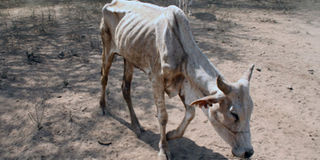Kenya Cabinet moves to tackle famine

An emaciated cow forages for pasture in Daaba in Isiolo on January 12, 2011. Herders are losing their cattle as drought continues to bite in most parts of the country. The government has now moved to tackle the famine crisis in the country. Photo/JENNIFER MUIRURI
Measures to tackle the looming famine in Kenya were outlined on Wednesday, especially in the pastoral areas.
People and livestock have died as drought continues toravage North Eastern, parts of Eastern, Coast and the North Rift.
In a media briefing after Wednesday’s Cabinet meeting, the government said food shortages would receive all the attention needed to prevent further deaths.
“The government assured all Kenyans top priority would be taken to minimise the impact of the La Nina weather that was being felt in some parts of the country,” the Cabinet said in the brief.
The Cabinet has now formed a food committee to work out details of the additional requirements, especially for the poor, the statement said.
Among the measures the Cabinet is considering is to start buying livestock from drought-hit areas to minimise losses as well as providing money to buy foodstuff to supplement the national food relief and the strategic grain reserve programmes.
The Cabinet committee will also work out requirements for buying livestock to reduce losses that pastoralists may suffer, it said.
A similar programme was adopted in 2009 when drought ravaged most parts of the country.
The intention is to ensure that people are cushioned against economic loss caused by the drought and that the country does not lose these animals.
However, despite acknowledging the looming effects of the La Nina crises, the Cabinet holds that there are adequate stocks to deal with the immediate food shortages through the national food relief and the strategic grain reserve programmes.
Relief organisations, including the Kenya Red Cross Society and some MPs have asked President Kibaki to declare the famine a national disaster.
But the statement after the Cabinet meeting declaring that there is sufficient food means the president will not declare a national disaster soon.
The government and the Kenya Red Cross Society though have issued a hunger alert after at least five people in Tana River County died of starvation.
Following the 2008 drought, the government raised the strategic grain reserve to eight million bags and expanded and revamped irrigation agriculture and research as well as extension institutions, staff recruitment and farm mechanisation.
The Cabinet committee will take into account available government resources to deal with the food shortage, the statement said.
The committee was also authorised to determine the amounts of fertilizer that should be imported this year to meet the national requirements at affordable prices.
At the same time, the Ministries of Agriculture and Livestock were directed to give a comprehensive account of the resources which were spent on these programmes last year, as these money was intended to be managed on a revolving basis.




